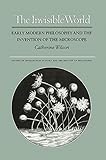The Invisible World : Early Modern Philosophy and the Invention of the Microscope / Catherine Wilson.
Material type: TextSeries: Studies in Intellectual History and the History of Philosophy ; 2Publisher: Princeton, NJ : Princeton University Press, [2020]Copyright date: ©1995Description: 1 online resource (290 p.)Content type:
TextSeries: Studies in Intellectual History and the History of Philosophy ; 2Publisher: Princeton, NJ : Princeton University Press, [2020]Copyright date: ©1995Description: 1 online resource (290 p.)Content type: - 9780691221823
- SCIENCE / History
- Accademia dei Lyncei
- Alhazen
- Bacon, Francis
- Berkeley, George
- Book of Nature
- Collegium Curiosae
- Copernicus
- Digby, Kenelm
- Divini, Eustachio
- Fournier, Marian
- Gregory
- Hippocrates
- Hutchison, Keith
- Jungius, Joachim
- Lucretius
- Nero
- Pasteur, Louis
- air pump
- ammalcula
- analogy
- atomism
- bacteria
- butterfly
- caterpillar
- charlatanry
- corpuscularianism
- dissection
- effluvia
- empiricism
- experimentation
- eyeglasses
- fermentation
- generation
- gonorrhea
- heliocentrism
- iatromechanism
- idealism
- influenza
- insects
- knowledge, scientific
- laboratory
- lenses
- magic
- mathematics
- mechanism
- metamorphosis
- myopia
- mysticism
- objectivity
- occasionalism
- ovism
- pananimism
- protozoa
- qualities
- 113
- online - DeGruyter
| Item type | Current library | Call number | URL | Status | Notes | Barcode | |
|---|---|---|---|---|---|---|---|
 eBook
eBook
|
Biblioteca "Angelicum" Pont. Univ. S.Tommaso d'Aquino Nuvola online | online - DeGruyter (Browse shelf(Opens below)) | Online access | Not for loan (Accesso limitato) | Accesso per gli utenti autorizzati / Access for authorized users | (dgr)9780691221823 |
Frontmatter -- Contents -- Preface -- 1. Science and Protoscience -- 2. The Subtlety of Nature -- 3. Instruments and Applications -- 4. Preexistent and Emergent Form -- 5. Animalcula and the Theory of Animate Contagion -- 6. The Philosophers and the Microscope -- 7. The Microscope Superfluous and Uncertain -- 8. Truths and Appearances -- Bibliography -- Index
restricted access online access with authorization star
http://purl.org/coar/access_right/c_16ec
In the seventeenth century the microscope opened up a new world of observation, and, according to Catherine Wilson, profoundly revised the thinking of scientists and philosophers alike. The interior of nature, once closed off to both sympathetic intuition and direct perception, was now accessible with the help of optical instruments. The microscope led to a conception of science as an objective, procedure-driven mode of inquiry and renewed interest in atomism and mechanism. Focusing on the earliest forays into microscopical research, from 1620 to 1720, this book provides us with both a compelling technological history and a lively assessment of the new knowledge that helped launch philosophy into the modern era. Wilson argues that the discovery of the microworld--and the apparent role of living animalcula in generation, contagion, and disease--presented metaphysicians with the task of reconciling the ubiquity of life with human-centered theological systems. It was also a source of problems for philosophers concerned with essences, qualities, and the limits of human knowledge, whose positions are echoed in current debates about realism and instrument-mediated knowledge. Covering the contributions of pioneering microscopists (Leeuwenhoek, Swammerdam, Malpighi, Grew, and Hooke) and the work of philosophers interested in the microworld (Bacon, Descartes, Leibniz, Malebranche, Locke, and Berkeley), she challenges historians who view the abstract sciences as the sole catalyst of the Scientific Revolution as she stresses the importance of observational and experimental science to the modern intellect.
Mode of access: Internet via World Wide Web.
In English.
Description based on online resource; title from PDF title page (publisher's Web site, viewed 30. Aug 2021)


